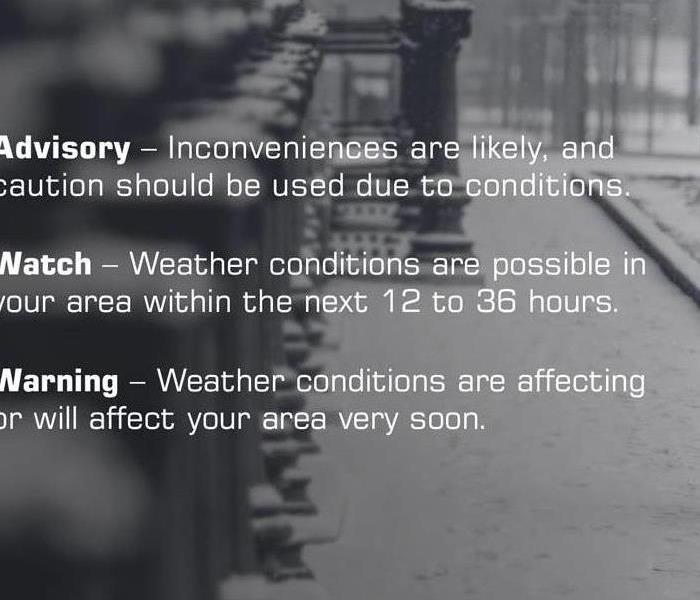Hurricane Season in Procress
9/3/2018 (Permalink)
Hurricanes are massive storm systems that form over warm ocean waters and move toward land. Potential threats from hurricanes include powerful winds, heavy rainfall, storm surges, coastal and inland flooding, rip currents, tornadoes, and landslides. The Atlantic hurricane season runs from June 1 to November 30. The Pacific hurricane season runs May 15 to November 30. Hurricanes:
- Can happen along any U.S. coast or in any territory in the Atlantic or Pacific oceans.
- Can affect areas more than 100 miles inland.
- Are most active in September.
IF YOU ARE UNDER A HURRICANE WARNING, FIND SAFE SHELTER RIGHT AWAY
- Determine how best to protect yourself from high winds and flooding.
- Evacuate if told to do so.
- Take refuge in a designated storm shelter, or an interior room for high winds.
- Listen for emergency information and alerts.
- Only use generators outdoors and away from windows.
- Turn Around, Don’t Drown! Do not walk, swim, or drive through flood waters.
Prepare NOW
- Know your area’s risk of hurricanes.
- Sign up for your community’s warning system. The Emergency Alert System (EAS) and National Oceanic and Atmospheric Administration (NOAA) Weather Radio also provide emergency alerts.
- If you are at risk for flash flooding, watch for warning signs such as heavy rain.
- Practice going to a safe shelter for high winds, such as a FEMA safe room or ICC 500 storm shelter. The next best protection is a small, interior, windowless room in a sturdy building on the lowest level that is not subject to flooding.
- Based on your location and community plans, make your own plans for evacuation or sheltering in place.
- Become familiar with your evacuation zone, the evacuation route, and shelter locations.
- Gather needed supplies for at least three days. Keep in mind each person’s specific needs, including medication. Don’t forget the needs of pets.
- Keep important documents in a safe place or create password-protected digital copies.
- Protect your property. Declutter drains and gutters. Install check valves in plumbing to prevent backups. Consider hurricane shutters. Review insurance policies.






 24/7 Emergency Service
24/7 Emergency Service
